Tau Zero’s founding architect brings news of a recent European Union meeting that included starships and their implications on the agenda. Here’s hoping that while he was there he also had the chance to sample some of those fabulous Belgian ales…
by Marc Millis

The European Union recently held a conference to collect information to plan for the coming decades of science and technology priorities. This included the theme of international collaboration and the implications for all humanity across the globe. As a part of this conference, the EU organizers invited Mae Jemison of the 100 Year Starship organization to chair a session about interstellar flight. Mae rounded up a suite of speakers including Buzz Aldrin (a genuine space celebrity), Jill Tarter (SETI), Lou Friedman (solar sail advocate and former Planetary Society director), Kathryn Denning (space anthropologist), Pam Contag (microbiologist), Marc Millis (propulsion physicist), and about half-dozen more.
Image: Outside the European Parliament building in Brussels. Credit: Marc Millis.
The presentations were recorded and can be accessed here either now or very shortly. Look for the link to 100 Year Starship Session at European Parliament 2013. There were 11 talks of roughly 4 minutes each, plus Q&A. The talks covered a healthy span of issues and approaches. This coverage included the motivations for star flight, the compelling reasons to begin now, the search for extraterrestrial intelligence, the degree of difficulty involved in achieving true star flight, and a variety of insights regarding the imperative to create sustainable closed loop life support.
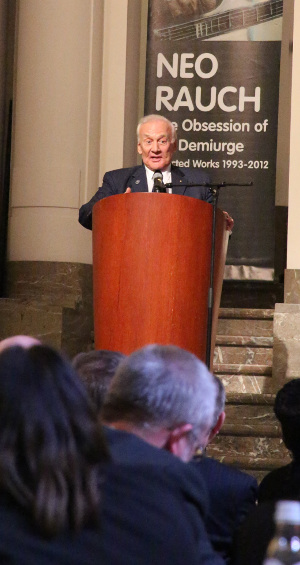
The topic of sustainable life support was given a healthy dose of attention. For human star flight, this is an unavoidable imperative whose methods must achieve 100% recycling. This forces achievements beyond what is necessary for Moon and Mars bases. In addition to the obvious issues of sustainable biology and human physical health, issues such as clothing manufacturing and recycling, governance methods, and questions about what cultures and individual life experiences would be fitting for an interstellar world ship emerged in these discussions.
Image: Buzz Aldrin addresses the guests during a dinner session. Credit: Ronke Olabisi.
While some might think that issues like these can be postponed until we are closer to the goal, remember that all humanity is trapped on a spaceship with a malfunctioning life-support system (human-induced climate change) right now, along with a radiation shielding system whose permanence is not guaranteed and a ‘crew’ that is largely oblivious to their responsibility for maintaining the habitability of spaceship Earth.
But all is not dark despite such gloomy prospects. There were also plenty of discussions about using the goal of star flight to provide a positive view of the future, something to allow us all to thrive, not just survive. For example, one talk suggested that we use the context of the love for our children to frame this positive future view. It was interesting that the person who made this comment, Jennie Yeung, also made the observation that she was the only Asian in this interstellar session and that Asians represent roughly half of the population of starship Earth.
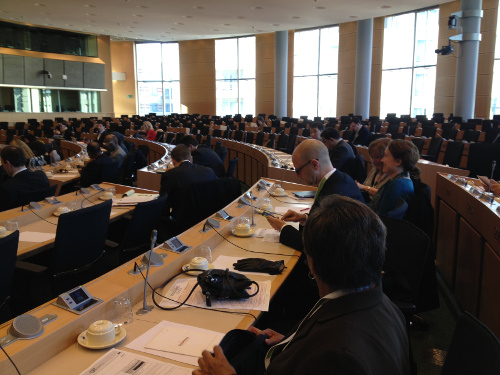
Image: The European Union session at work. Credit: Marc Millis.
Sustaining Spaceship Earth, and learning how to create more world ships, calls for a world-wide endeavor. The focus of subsequent discussions was, “What do we do next?” Recall that at our present rate of procrastination, two-centuries remain before starflight might become possible (not including precursor missions). What is not known is if human society will survive long enough to achieve that sustained survival ability. Amongst the speakers, deep thinkers in their own right, there was frank discussion about such unknowns and what we can each do to make a better future. While Mae Jemison assembles a proposal to the European Union for interstellar work, the individual speakers discussed amongst themselves how to collaborate and what we can each do as we pursue our own specialties to make relevant progress. Despite the encouraging invitation from the European Union that puts the focus on these possibilities, there is no guarantee that there will be funding for this type of work.
The effect of star flight on society was also discussed. First, when considering the levels of energy needed to achieve interstellar flight, our civilization will have had to have achieved sustainable peace amongst ourselves. Even a slight misuse of these levels of energy could destroy the entire surface of Earth. Humanity must mature to have the responsibility to use such prowess safely.
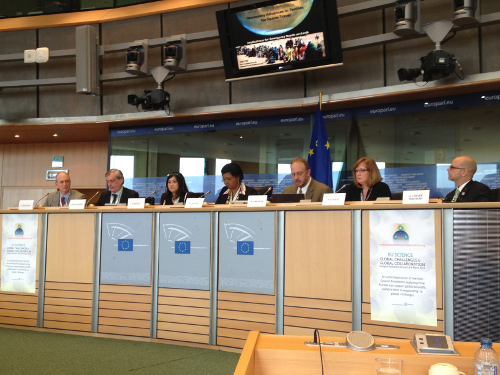
Image: Speakers’ stations at the meeting. Credit: Marc Millis.
John Carter McKnight, Kathryn Denning, and others articulated the dimensions of the ethics and regulatory issues involved in moving towards interstellar capabilities. And when it comes to how to tell the story of the values and risks of interstellar flight, Kathryn Denning suggested that we avoid using some common analogies that have been popularized to discuss spaceflight. Specifically she cautioned against analogies to Columbus and Magellan, since these events of discovery also included some of the uglier sides of humanity, such as greed, mutiny, and slavery. In short we need to create a new positive message that accurately conveys the opportunities risks and sensible steps to eventually achieve both the societal maturity and technological capability of star flight, and in so doing, vastly improve life on Earth.
In the meanwhile then, while we all wait for our ideal levels of funding to come in, we shall continue ad astra incrementis, to the stars in ever-increasing steps.
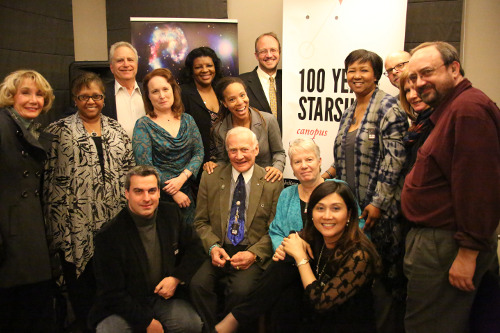
Image: A group shot following discussions on the 100 Year Starship project in Brussels. The front four: Marsal Gifra, Buzz Aldrin, Jill Tarter, Jennie Yeung. In back curving from left to right, Kathleen Colgan, Gwen R. Artis, Lou Friedman, Kathryn Denning, Alires Alimon, Ronke Olabisi, Karl Aspelund, Mae Jemison, John Carter McKnight, Pam Contag, Marc Millis. Credit: Ronke Olabisi.

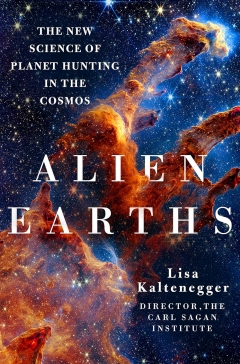

“What do we do next?” — now tell me, how many of the speakers said that what needed to be done next was to solve the problem of regular, safe, economically affordable and exponential-growth-capable passenger access to low Earth orbit? (The mission which the Shuttle was designed to accomplish, 40 years ago, with weekly flights to make access to space routine.) And those who did not mention this, what was the next practical step forward that they did advocate, please?
Stephen
Stephen,
This is not a matter of one or the other. (near space vs starflight). It is a matter of a smart blend of a span of activities. There are plenty of folks (and orders of magnitude more funding) going into cost effective Earth to Orbit, plus Moon and Mars base plans. The interstellar folks would be foolish to duplicate that work.
What the interstellar topic gives us, is a context to look beyond those near-term steps… toward the bigger issues and challenges that those nearer term steps cannot address. History has repeatedly shown that mere next-steps are not enough. Jets were not created by making more affordable piston-propeller aircraft. Transistors were not the result of vacuum tube work. ETC…
It would be as inappropriate to ask the near-space folks to work on starflight as it is to ask the starflight folks to work on near-space. It’s not one or the other, it is a mix of both.
Furthermore, the amount of resources sought for starflight is trivial when compared to what is already being invested in near space work. Even if funds were taken from near space to fund starflight pursuits (BTW, are seeking donations from outside that community), it would be less than fractional percentages of what they have.
If you wish to support “regular, safe, economically affordable and exponential-growth-capable passenger access to low Earth orbit,” then invest in SpaceX. Such venues exist. If that is were your passion lays, then go for it. If that is were your passion lays, then you are in the wrong place if you are looking for that here. We look beyond, in part because we know that those other prerequisites are already being heavily worked.
Marc
Marc, it is indeed reassuring to hear that proper access to LEO is being, as you put it, heavily worked. I was afraid that it might not be, particularly here in the EU, since ESA has, so far as I know, very little interest in the subject. Though the British government is now beginning to support new ventures, European equivalents to SpaceX are still thin on the ground. And without that easy access to space, no starship plans will ever come to fruition.
Obviously I am not suggesting that you duplicate such work — but that you *energise* it with precisely those long-range plans for interstellar travel in order to jolt this sleepy European backwater out of its complacency.
Stephen
Oxford, UK, European Union
Marc,
I really enjoyed listening to the presentations that were made to the European Union. I perceive that the next step beyond NEO will be an extensive expansion into interplanetary space – where humanity will most likely become a spacefaring race. Although I know that there continues to be much legitimate research around the warp drive concept, I am really skeptical of its successful application. While I loved the Deep Space Nine stories, I suspect that Wormhole research is a dead end. Time will tell!
That said , I absolutely believe that we , as a species , will expand into interstellar space – into our own galaxy. It may be more like our gradual expansion over our home planet. It is hard to predict. After all, the Age of Rapid “World-Wide ” Technological innovation is only 200 years old .
Finally, I truly appreciate what you , Dr. Jemison and the others are doing right now and in the future
Okay, I’ve now viewed all the videos. Firstly, thank you for posting them, and enabling those who were not able to go to be virtually present. I have posted feedback on most of them, hopefully constructively (under my YouTube persona, JazzOnTheMoon).
I was shocked to see that you were addressing an almost empty lecture hall (e.g. Contag video, 1:06). Apparently interstellar flight, in Europe at least, is still very much like playing jazz, where you consider yourself a great success if the audience outnumbers the band.
Generally, I have to say that there’s lots of discussion of various technicalities but a great lack of connection with Europe in the here and now. At the start of your write-up above, you say that the purpose of the conference was to help Europe plan for the coming decades, but if I had been a Eurocrat in that select audience, I would have come away with lots of warm feelings about the future of humanity among the stars but no particular plan of action. I would have felt secure in the belief that business could potter along nicely as usual under the tender mercies of ESA, and I would not have to display any initiative or leadership to make anything particular actually happen.
But if I had been a speaker, I would have been concerned precisely to shatter that complacency. Hence my earlier comments above on this thread.
Stephen
Oxford, UK
“If you wish to support “regular, safe, economically affordable and exponential-growth-capable passenger access to low Earth orbit,” then invest in SpaceX.”
Hi Marc,
There are a few people out here in space enthusiast land who are not SpaceX fans. I will leave it at that.
My first thought when it comes to star travel is always about freezing people. A single science daily article many years ago really fired my imagination concerning this possibility.
http://www.sciencedaily.com/releases/2006/06/060620171022.htm
The second thought that comes to mind is H-bombs. IMO opinion we are missing one critical technology- not even researching it- and ignoring the other one.
Thanks for your efforts.
Gary
The problem with a closed loop life support system is the waste metabolites building up; or so I have read. If you have a fission reactor supplying enough energy (plasma converters of course use a great deal) then this problem seems to disappear.
So is it just a matter of having the energy to burn?
http://science.howstuffworks.com/environmental/energy/plasma-converter.htm
My first post neglected to mention that you guys seem to be talking to a nearly empty room. That did not take away from the importance of what you had to say. The EU is a political organization which responds to pressures and initiatives from the citizens of its own member nations. I suspect that for them the ESA is the forum for space exploration. I do not know. What is your take on the reception to your presentations?
About the small attendance…
There were complications that had nothing to do with interest. Thankfully, some high ranking folks were there, and that the videos are freely available will helps counter the limited number of folks that could get in the room.
About next steps…
It is my understanding that Mae (100 Year Starship) is putting something together to submit to the EU, based on the input and discussions of all the speakers. It is too early to tell how that will turn out.
I’m on the road (again), so I don’t have time yet to elaborate on the other questions. Hopefully later.
Telling Stories of the Future with 100 Year Starship
By: Kit OConnell
Sunday April 7, 2013 12:21 pm
Has humanity stopped looking to the future with hope?
Sometimes it feels like we’re so embroiled in the struggle over whether we’ll despoil our environment or dismantle all our safety nets in the next few years that we can’t look toward what life might look like in decades, much less a century and imagine things better than they are right now. Yet looking toward our far future helps us think about things now in a new light. One reason is that trying to solve very big problems forces us to fix a lot of smaller ones along the way.
At SXSW Interactive, the most mind-bending panel I attended was hosted by the 100 Year Starship foundation. This nonprofit began as a conference in 2011 sponsored by NASA and DARPA, with the idea of launching a foundation devoted to a very big idea: what capabilities would humanity need to send a one-way mission to another planet within the next hundred years?
Astronaut Dr. Mae Jemison submitted the winning proposal, which envisioned a project devoted not just to the physical technology of the journey but also the social and cultural needs. Last year, the 100YSS held its first independent symposium in Houston, with presentations on everything from using hydrogels to fight bone mass loss to the heady question of what kind of clothes we’d wear on a voyage that takes decades, or whether we’d wear clothing at all! The forward-thinking group has already been invited to consult with the European Union at a conference about the future.
It’s become cliche to point out that we’re on a collective space voyage with a crew of six billion people, in a self-contained, irreplaceable craft. Our recent, space-going past proved that technologies developed for travel to outer space and the moon benefit humans on earth in near-countless ways. If we — not just NASA or the United States, but humanity as a whole — tackled the challenge of interstellar travel what might we learn about efficiently and ethically feeding, clothing, powering and preserving this world?
During the SXSW panel, Dr. Jemison, along with Dr. Jill Tarter, of the Search for Extraterrestrial Intelligence, and LeVar Burton spoke philosophically about the challenges facing humanity and how a grand project could bring our world together.
Dr. Tarter told us that, “”We’re on the verge of being able to tell you where to look in the sky to find Earth 2.0.” So what do we do when we find it?
“There is an inextricable link between that which we imagine and that which we create,” Levar Burton said. So could imagining new stories — stories about interstellar travel — create a healthier, more peaceful Earth at the same time we prepare to leave?
Jemison quoted an African proverb: ”No one shows a child the sky.” Space is a part of all humanity, so will we answer its call?
Last week I interviewed Dr. Jemison about the project. Her staff at 100YSS cautioned me that with her busy schedule, she’d only have five or ten minutes. Instead, we ended up talking for almost half an hour. It seemed impossible — and unfair to FDL’s readers — to boil that down into just a few sound bites, so instead I transcribed our entire conversation below. I hope you enjoy reading it as much as I enjoyed having it!
The 2013 100-Year Starship Symposium takes place in Houston from September 19 to 22, other details on the 100YSS Project homepage.
Full article here:
http://bytegeist.firedoglake.com/2013/04/07/100yss-sxsw/